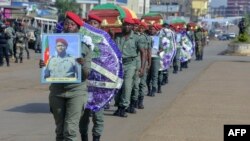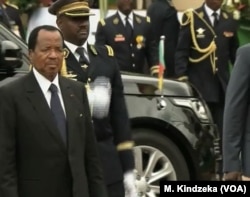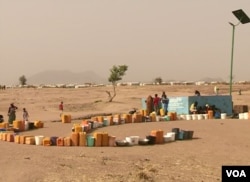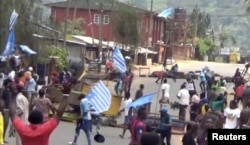Cameroon's government says the number of soldiers and police killed while fighting armed English-speaking separatists who want to split from the French speaking regions of the country has increased from 80 to more than 100 in the last two weeks and kidnapping of members of the security forces also continue to rise.
With civilians and separatists complaining of widespread human rights abuses by the military and police, calls are growing for genuine dialogue to end the war.
Members of civil society are pressing Cameroonian President Paul Biya to free arrested leaders of armed groups for peace to return and the carnage to stop.
Speaking before an unusually quiet parliament, Cameroon Defense Minister Joseph Beti Assomo read the names of soldiers and policemen who have died in the war against armed separatists fighting for the independence of an English-speaking-state in Cameroon.
As Beti Assomo read through the list, VOA counted more than 120 names of slain servicemen.
The defense minister was invited by the lawmakers to give a balance sheet of a war that Cameroon president Paul Biya declared seven months ago against people he said were "terrorists" wanting to divide his country.
Robert Bapooh Lipot, a UPC opposition political party lawmaker, says it was the most touching plenary session of parliament he has ever witnessed in Cameroon.
"This is the worst thing which can happen to a soldier," he said. "A soldier knows that he can die while defending the integrity of his nation against another army, but never against its own citizens. That is why we think that those who took guns against our nation, they must now abandon this option and know that we are belonging to the same country."
The figures given by Beti Assomo indicate that about 40 more soldiers had lost their lives in less than one week since Cameroon's prime minister, Philemon Yang, announced that the country had lost about 84 military and policemen and launched a $23 million emergency humanitarian assistance plan for hundreds of thousands of citizens who he said live in precarious and life-threatening conditions in Cameroon and in neighboring Nigeria due to war.
He said hundreds had been killed, and 74,000 internally displaced persons were facing famine along with disastrous health conditions. He said 21,000 others had fled to Nigeria.
United Nations estimates are even higher. The world body says more than 100,000 people, a majority of them school-aged children, have fled the violence in the English-speaking regions for safer locations. Forty thousand have crossed over to Nigeria and many are missing.
A new report published two weeks ago by the international human rights group Amnesty International criticizes both the Cameroon military and armed separatists for using unnecessary and excessive force, stating that civilians are frequently caught up in the violence.
Amnesty said Cameroon’s military has been responding with arbitrary arrests, torture, unlawful killings and destruction of property, which the group says radicalizes youths and drives them to join the separatists. Cameroonian government officials described Amnesty's allegations as unfounded.
Emmanuel Tatah, a civil society activist and leader of a group known as Unite Cameroon, says the conflict continues to claim lives because many people do not trust the military and the leadership.
"We should be guided by truth. There is a lack of confidence between the people, the government and the institutions," he said.
There have been calls for President Biya to be open to dialogue and to release Ayuk Tabe, the man who proclaimed himself as president of what he called the English-speaking "Republic of Ambazonia." Tabe was arrested in Nigeria with 47 of his collaborators and extradited to Cameroon. His supporters have vowed on social media that Cameroon will not have peace if he and his peers are not released.
Violence broke out in the English-speaking northwest and southwest regions of Cameroon in November 2016 when a strike by English-speaking lawyers and teachers against what they described a marginalization by the French-speaking majority in the bilingual country degenerated into calls for secession. In November 2017, President Paul Biya declared war on the separatists, labeling them "terrorists."
Biya has said on several occasions he is not ready to listen to anything that may compromise the unity of his country.







